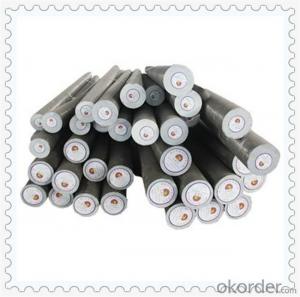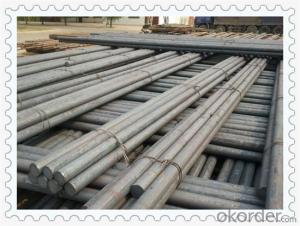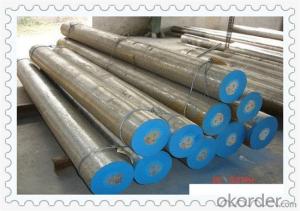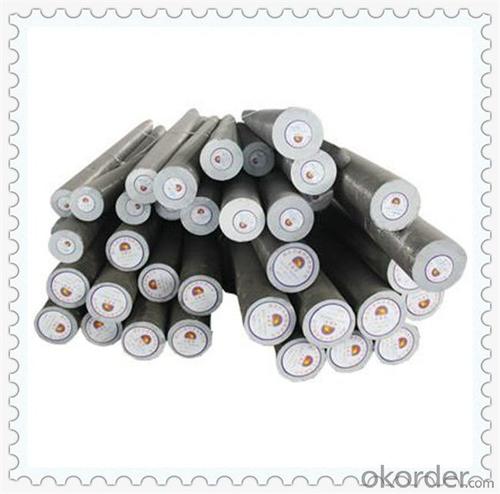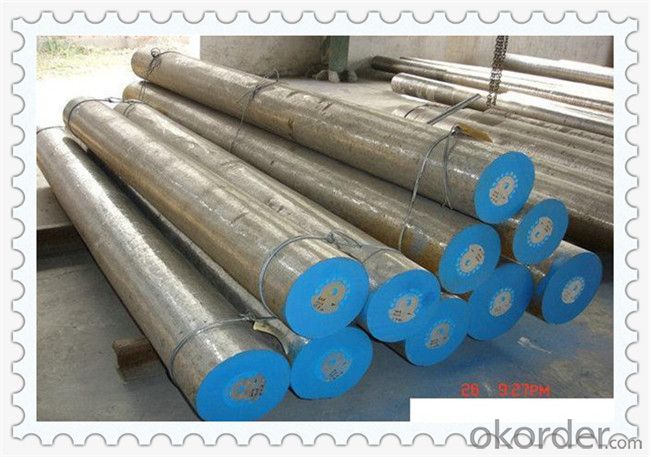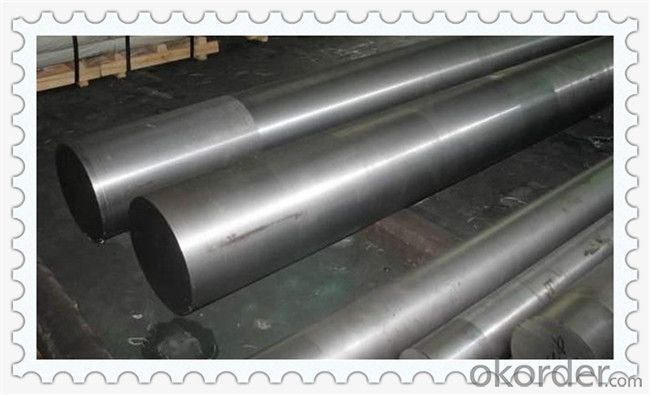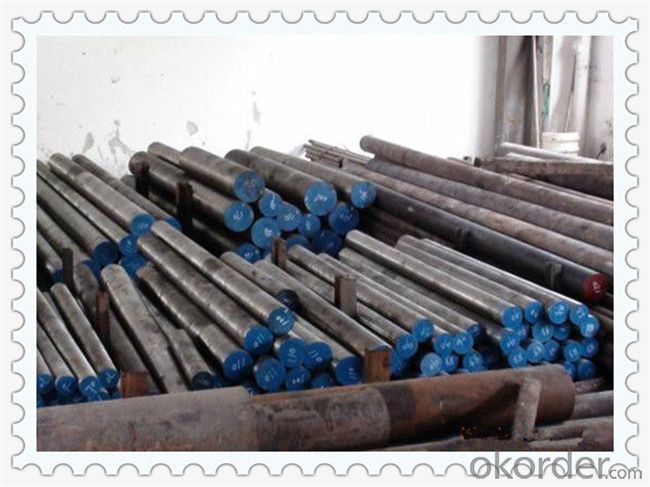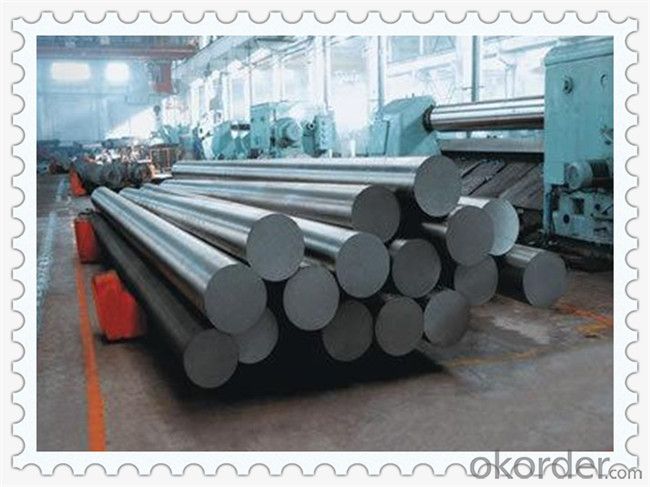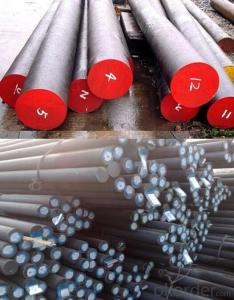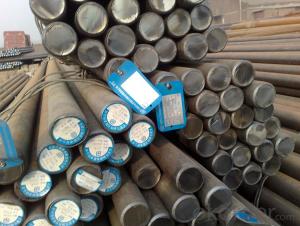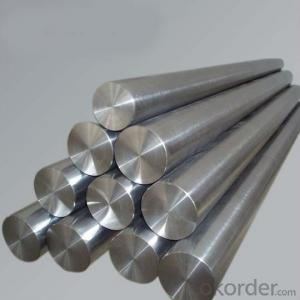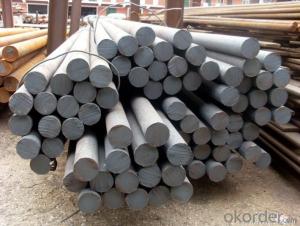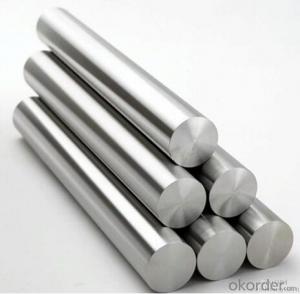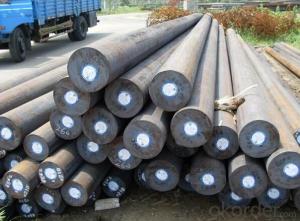Alloy Steel AISI 4340 Materials 1.6582
- Loading Port:
- China main port
- Payment Terms:
- TT OR LC
- Min Order Qty:
- 50 m.t.
- Supply Capability:
- 10000 m.t./month
OKorder Service Pledge
OKorder Financial Service
You Might Also Like
Alloy Steel AISI 4340 Materials 1.6582
Products Details
Similar or Equivalent Grades
GB | ASTM | JIS | ISO |
40CrNiMoA | 4340 | SNCM439 | 36CrNiMo4 |
Chemical composition
Standard |
Grade |
C |
Cr |
Ni |
Mo |
Si |
Mn | P | S | Cu |
≤ | ||||||||||
GB | 5CrNiMo | 0.37-0.44 | 0.60-0.90 | 1.25-1.35 | 0.15-0.25 | 0.17-0.37 | 0.50-0.80 | 0.025 | 0.025 | 0.30 |
JIS | SNCM439 | 0.36-0.43 | 0.60-1.00 | 1.60-2.00 | 0.15-0.30 | 0.15-0.35 | 0.60-0.90 | 0.030 | 0.020 | 0.30 |
ASTM | 4340 | 0.38-0.43 | 0.70-0.90 | 1.65-2.00 | 0.20-0.30 | 0.15-0.35 | 0.65-0.85 | 0.025 | 0.025 | — |
ISO | 38CrNiMo4 | 0.32-0.40 | 0.90-1.20 | 0.90-1.20 | 0.15-0.30 | 0.10-0.40 | 0.50-0.80 | 0.035 | 0.035 | — |
Mechanical Property
Tensile strength | Yield strength | Elongation rate | Contractibility rate | Impact Energy | Hardness(HBS100/3000) |
≥980MPa | ≥835MPa | ≥12% | ≥55% | ≥78J | ≤269 |
Characteristics
1) High hardability.
2) High strength and toughness.
3) Poor cold deformation plasticity and weldability.
4) Poor corrosion resistance.
Application
Bent axle of engine, cross beam, undercarriage, pressure vessel, torsion shaft, transmission shaft, frictionclutch shaft, etc.
Products Show
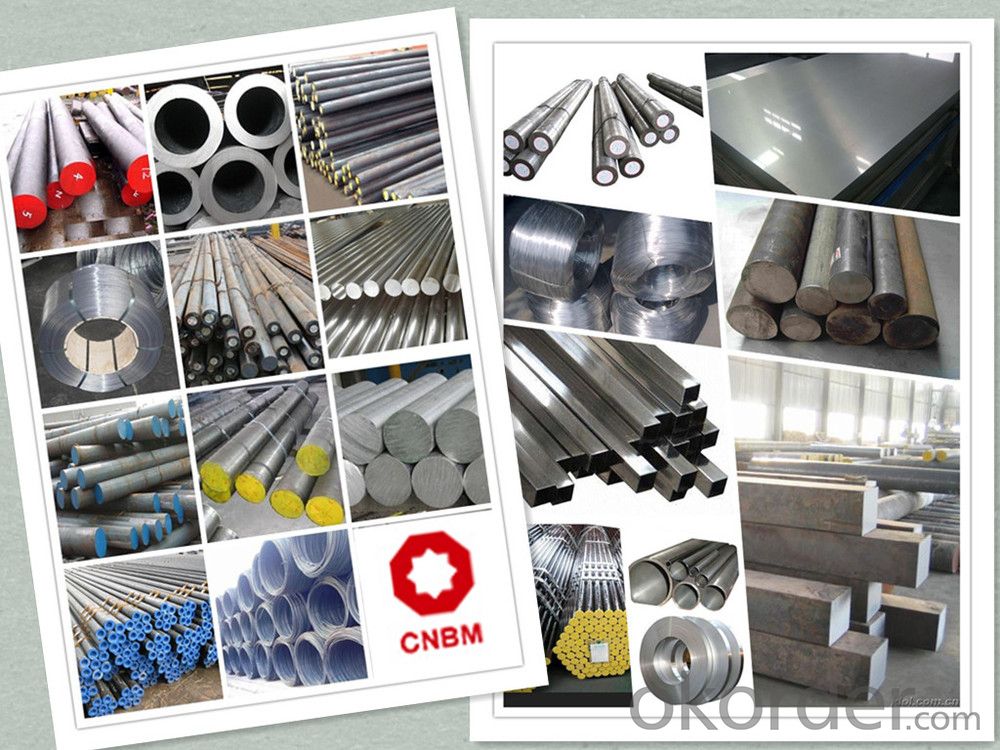
Product Overviews
| Product Name | Typical Grades | Diameter(mm) | Standard adopted |
| Carbon Steel | 20 (1020/S20C/C22) | Ø16-Ø300 |
GB/SAE/JIS/DIN
|
| 40 (1040/S40C/C40) | |||
| 45 (1045/S45C/C45) | |||
| Bearing Steel | GCr9 (51100/SUJ1) | Ø12-Ø250 | |
| GCr15 (52100/SUJ2/100Gr6) | |||
| GCr9SiMn (A485-Gr.1/SUJ3) | |||
Cr-Mo Steel | 20Cr (5120/SCr420H/20Cr4) | Ø12-Ø250 | |
| 40Cr (5140/SCr440/41Cr4) | |||
| 42CrMo(4140/SCM440/42CrMo4) | |||
| Gear Steel | 20CrNiMo | Ø16-Ø600 | |
| 20CrMn(5115/SMnC420/20MnCr5) | |||
| 20CrNiMo(8620/SNCM220/20CrMiMo2) |
Application
| Carbon Steel | Mold bottom, Plastic mold, Construction machinery parts Automobile parts, Security grills, Screens, Construction |
| Bearing Steel | Aerospace, Navigation, Nuclear energy, Chemical industry Electronic information, Petrochemical, Instrument and meter Transportation |
| Cr-Mo Steel | Mechanism & Fasteners gear, Stressed components for vehicles Engines and machines, Parts of larger cross-section |
| Gear Steel | All kinds of gears, Statically and dynamically stressed component for vehicles Engines and machine, Larger cross-section parts, Crankshafts |
Work Shop
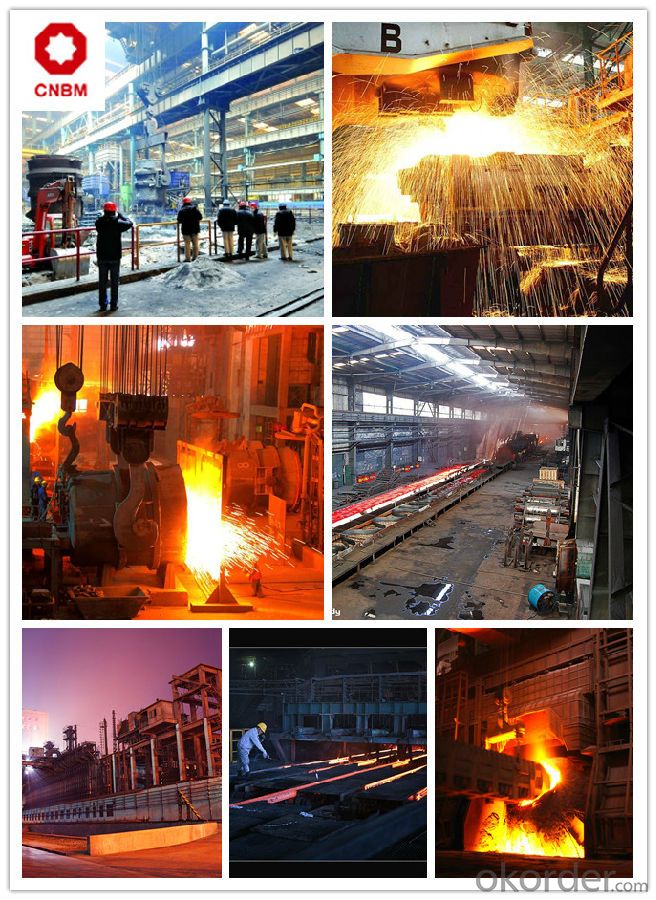
Company Information
CNBM International Corporation is the most important trading platform of CNBM group.
Whith its advantages, CNBM International are mainly concentrate on Cement, Glass, Iron and Steel, Ceramics industries and devotes herself for supplying high qulity series of refractories as well as technical consultancies and logistics solutions.

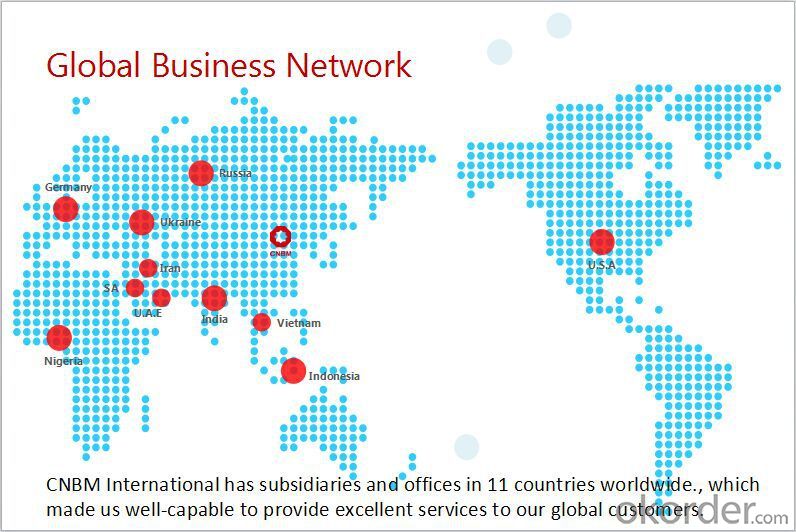
FAQ
1, Your advantages?
professional products inquiry, products knowledge train (for agents), smooth goods delivery, excellent customer solution proposale
2, Test & Certificate?
SGS test is available, customer inspection before shipping is welcome, third party inspection is no problem
3, Factory or Trading Company?
CNBM is a trading company but we have so many protocol factories and CNBM works as a trading department of these factories. Also CNBM is the holding company of many factories.
4, Payment Terms?
30% TT as deposit and 70% before delivery.
Irrevocable L/C at sight.
5, Trading Terms?
EXW, FOB, CIF, FFR, CNF
6, After-sale Service?
CNBM provides the services and support you need for every step of our cooperation. We're the business partner you can trust.
For any problem, please kindly contact us at any your convenient time.
We'll reply you in our first priority within 24 hours.
Packaging & Delivery
1, Packaging: seaworthy package or as required
2, Delivery: 35-45 days or based on quantity
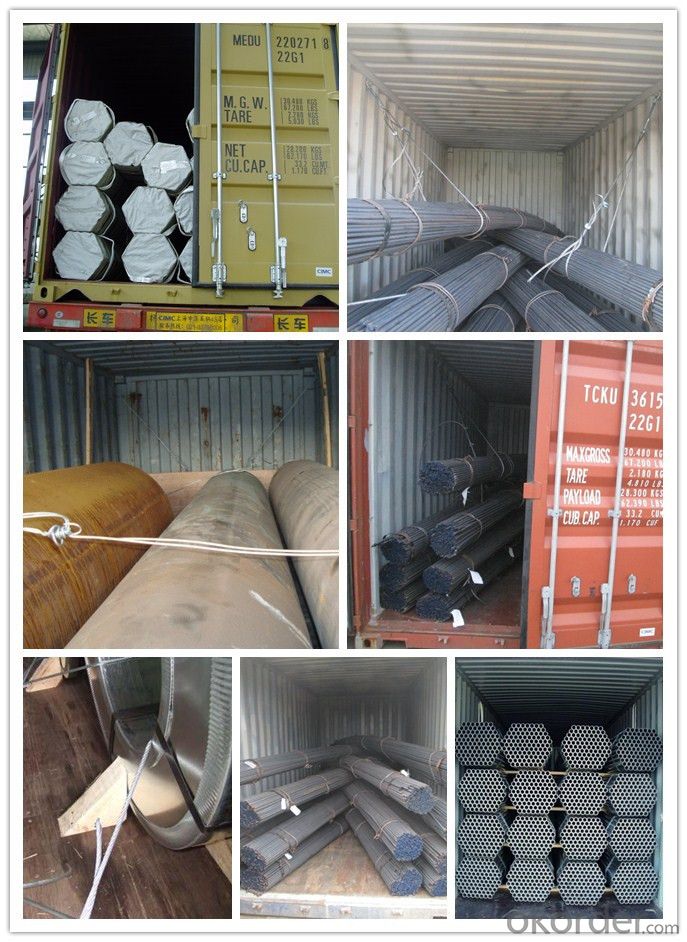
- Q: Can steel round bars be used in the automotive manufacturing?
- Yes, steel round bars can be used in automotive manufacturing. Steel round bars offer high strength and durability, making them suitable for various automotive components such as crankshafts, camshafts, axles, and suspension parts. They also provide excellent machinability and can be easily fabricated into the required shapes and sizes, making them a preferred choice in the automotive industry.
- Q: How do steel round bars compare to other materials like aluminum or stainless steel?
- Steel round bars have several advantages over other materials like aluminum or stainless steel. Firstly, steel round bars are known for their exceptional strength and durability. They have a high tensile strength, making them capable of withstanding heavy loads and extreme conditions. This makes them ideal for applications where strength and resilience are crucial, such as construction, manufacturing, and engineering. Compared to aluminum, steel round bars offer superior strength and hardness. While aluminum is lightweight, it is not as strong as steel, which can be a limiting factor in certain applications. Steel round bars also have a higher resistance to impact and abrasion, making them more suitable for heavy-duty applications that require resistance to wear and tear. In terms of comparing steel round bars to stainless steel, it's important to note that stainless steel is an alloy that contains steel as its main component. Stainless steel is known for its corrosion resistance, making it an excellent choice for applications where exposure to moisture or harsh environments is a concern. However, stainless steel does not possess the same level of strength as steel round bars. Steel round bars are capable of carrying heavier loads and providing better structural integrity. Another aspect to consider is the cost-effectiveness of steel round bars compared to aluminum or stainless steel. Steel is generally more affordable than stainless steel and aluminum, making it a popular choice for a wide range of applications. Additionally, steel round bars are readily available in various sizes and grades, offering versatility and ease of use. Overall, steel round bars excel in terms of strength, durability, and cost-effectiveness when compared to other materials like aluminum or stainless steel. However, the choice of material ultimately depends on the specific requirements of the application and the desired properties needed for the project.
- Q: What are the typical yield strengths of different grades of steel round bars?
- The yield strength of steel round bars can vary depending on the specific grade of steel. Here are some typical yield strengths for different grades of steel round bars: - Mild steel round bars typically have a yield strength of around 250 MPa (megapascals) or 36,000 psi (pounds per square inch). - Carbon steel round bars can have a yield strength ranging from 350 to 550 MPa or 50,000 to 80,000 psi. - Alloy steel round bars, such as 4140 or 4340, generally have higher yield strengths compared to mild or carbon steel. The yield strength of these alloys can range from 550 to 850 MPa or 80,000 to 120,000 psi. - Stainless steel round bars come in various grades, and their yield strengths can vary accordingly. For example, austenitic stainless steels like 304 or 316 typically have yield strengths ranging from 200 to 300 MPa or 29,000 to 43,000 psi. On the other hand, duplex stainless steels like 2205 or 2507 can have higher yield strengths ranging from 450 to 650 MPa or 65,000 to 95,000 psi. It is important to note that these values are just typical ranges, and the actual yield strength of a specific grade of steel round bar may differ based on factors such as heat treatment, manufacturing process, and other variables. Therefore, it is always recommended to consult the manufacturer's specifications or industry standards for accurate and precise yield strength values of steel round bars.
- Q: Can steel round bars be painted?
- Steel round bars can indeed be painted in order to protect them from corrosion and improve their appearance. However, prior to painting, it is crucial to properly prepare the surface of the steel round bars by thoroughly cleaning, degreasing, and eliminating any rust or mill scale. This can be accomplished through various methods such as sandblasting, wire brushing, or chemical cleaning. Once the surface is adequately prepared, it is necessary to apply a primer specifically formulated for steel to enhance the adhesion of the paint. Subsequently, the desired paint can be applied to the steel round bars using brushes, rollers, or spray equipment. It is essential to select a paint that is suitable for outdoor use and offers ample protection against harsh weather conditions. To ensure the long-lasting durability of the painted steel round bars, regular maintenance and periodic repainting may be necessary.
- Q: Can steel round bars be used for making jewelry?
- Yes, steel round bars can be used for making jewelry, particularly for creating bold and industrial-style pieces. However, steel may not be as popular as other metals such as gold, silver, or stainless steel for traditional or delicate jewelry designs.
- Q: What are the advantages of using precipitation-hardening steel round bars?
- There are several advantages of using precipitation-hardening steel round bars in various applications. Firstly, these bars offer exceptional strength and hardness, which makes them suitable for use in industries that require robust and durable materials. The precipitation-hardening process involves heat treatment, which increases the strength of the steel, making it highly resistant to wear, deformation, and fatigue. Secondly, precipitation-hardening steel round bars have excellent corrosion resistance properties. This makes them ideal for applications in marine environments or industries where exposure to harsh chemicals or corrosive substances is common. The steel's resistance to corrosion helps ensure the longevity and reliability of the components or structures made from it. Another advantage is the versatility of these bars. They can be easily machined, welded, and forged, allowing for flexibility in design and fabrication processes. This makes them suitable for a wide range of applications, including aerospace, automotive, construction, and oil and gas industries. Furthermore, precipitation-hardening steel round bars offer good dimensional stability. They have low rates of thermal expansion, meaning they retain their shape and size even under extreme temperature variations. This characteristic is particularly important in applications where dimensional accuracy and stability are crucial, such as precision engineering or tool manufacturing. Lastly, the availability of a wide range of grades and sizes of precipitation-hardening steel round bars makes it easier to find the most suitable option for specific requirements. Different grades offer varying levels of strength, toughness, and corrosion resistance, allowing for tailored solutions to meet different application needs. Overall, the advantages of using precipitation-hardening steel round bars include their exceptional strength, corrosion resistance, versatility, dimensional stability, and the availability of various grades. These advantages make them a preferred choice for many industries where high-performance and durable materials are essential.
- Q: What is the difference between a peeled and a polished steel round bar?
- A peeled steel round bar and a polished steel round bar are two different types of steel bars with distinct characteristics and applications. A peeled steel round bar is a steel bar that has undergone a peeling process. During this process, the outer surface of the bar is removed, resulting in a smooth and clean finish. The peeling process removes any imperfections or scale on the surface of the bar, improving its appearance and quality. This makes peeled steel round bars ideal for applications where a smooth surface is required, such as in the manufacturing of precision components, shafts, or spindles. The process of peeling also enhances the mechanical properties of the bar, improving its strength and toughness. On the other hand, a polished steel round bar is a steel bar that has undergone a polishing process. In this process, the surface of the bar is polished using abrasive materials to create a shiny and reflective finish. The polishing process removes any surface imperfections, scratches, or dullness, resulting in a visually appealing and aesthetically pleasing appearance. Polished steel round bars are often used in decorative applications, architectural designs, or in industries where a visually attractive finish is desired, such as in furniture manufacturing or automotive accessories. In summary, the main difference between a peeled and a polished steel round bar is the process they undergo and the intended applications. A peeled steel round bar is processed to remove imperfections and improve mechanical properties, making it suitable for precision components, while a polished steel round bar is processed to create a shiny and reflective surface, making it ideal for decorative or visually appealing applications.
- Q: What are the different surface roughness options for steel round bars?
- The different surface roughness options for steel round bars can vary depending on the manufacturing process and specific requirements. Some common surface finishes for steel round bars include smooth, turned and polished, ground, and rough. These options provide different levels of smoothness and surface texture to meet various industrial and aesthetic needs.
- Q: Can steel round bars be used in the manufacturing of architectural features?
- Yes, steel round bars can certainly be used in the manufacturing of architectural features. Steel is a versatile and durable material that can be shaped and formed into various architectural elements such as columns, beams, handrails, and decorative features. Its strength and resistance to corrosion make it suitable for both structural and decorative purposes in the construction of buildings and other architectural designs.
- Q: How can steel round bars be protected against rust?
- There are various ways to protect steel round bars from rust. One popular method involves applying a protective coating, like paint or a rust-resistant primer, which acts as a barrier between the steel and its surroundings, preventing moisture and oxygen from reaching the metal surface. Another effective approach is to galvanize the steel by immersing it in molten zinc. This creates a sacrificial barrier that shields the steel, even if it gets scratched or damaged. Maintaining the steel round bars is crucial in preventing rust. This involves keeping them clean and dry, as moisture is a major catalyst for rust formation. Regular inspections for rust or damage and prompt repairs are also important to prevent further corrosion. Storing the bars in a dry and well-ventilated area can help reduce the risk of rust. Elevating the bars off the ground or using moisture-absorbing materials, like silica gel packets, can provide additional protection against moisture buildup. Lastly, using corrosion inhibitors or rust-preventative oils can create a thin film on the surface that inhibits rust formation. By implementing these methods, steel round bars can be effectively shielded from rust, ensuring their durability and structural integrity.
Send your message to us
Alloy Steel AISI 4340 Materials 1.6582
- Loading Port:
- China main port
- Payment Terms:
- TT OR LC
- Min Order Qty:
- 50 m.t.
- Supply Capability:
- 10000 m.t./month
OKorder Service Pledge
OKorder Financial Service
Similar products
Hot products
Hot Searches
Related keywords
